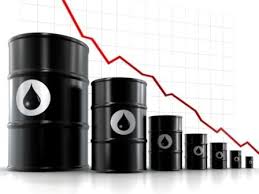Oil tumbles 5% after Greek ‘no’ vote, ahead of Iran deadline
Oil prices tumbled their most in three months on Monday, with US crude falling 5%, after Greece’s rejection of debt bailout terms and China’s rolling out of emergency measures to support its stock markets shook global markets.
Adding to the pressure on oil markets, Iran and global powers were trying to meet a July 7 deadline on a nuclear deal, which could add more oil to oversupplied markets if sanctions on Iran are eased. The self-imposed deadline could be extended again, officials at the negotiations said.
US crude was down $2.61 at $54.32 a barrel by 2.45pm GMT, breaking below the 100-day moving average and heading for its worst loss in a day since the near 7% drop on April 8.
“What happens now depends on the bears’ ability to break down $54 which is a major level of support,” said Fawad Razaqzada, a London-based technical analyst for forex.com. “A closing break below $54 could pave the way for a move down to $50.” Brent fell $1.60, or 2.7%, to $58.72, also snapping the 100-day average.
Greeks voted a resounding no to a referendum on an international bailout that also put in doubt its membership in the euro. The euro fell against the dollar, weighing on demand for dollar-denominated commodities from holders of the single currency.
“Uncertainty over Greece is bearish for oil. It adds an extra negative factor on top of the turmoil in Chinese financial markets, the recent rise in US drilling rigs, and a potential increase in Iranian oil supply,” said Olivier Jakob, senior energy analyst at Petromatrix in Zug, Switzerland.
Commodities were also sucked into market turmoil that has seen Chinese shares fall as much as 30% since June due in part to the economy growing at its slowest pace in a generation.
In Vienna, a dispute over UN sanctions on Iran’s ballistic missile programme and a broader arms embargo were among issues holding up a nuclear deal between Tehran and six world powers.
Iran is seeking to restore oil exports that have dropped from 2.5-million barrels per day in 2011 to about 1-million bpd in 2014.
Morgan Stanley analysts said up to 700,000 bpd in new Iranian exports were likely to arrive between late 2015 or early 2016, delaying the recovery in oil prices and US output by 6 to 12 months.
Reuters


